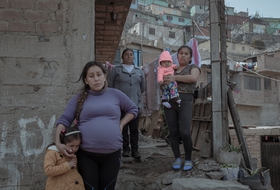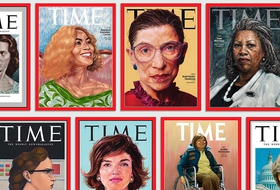
One in three women have suffered physical or sexual violence. With contributions from Europe, Africa, Asia and Latin America, we look at how this shadow pandemic affects every corner of the world.
Reclutate nelle comunità locali le ragazze pattugliano l’area del Greater Kruger National Park per contrastare il bracconaggio.
Who said that the fight against poaching is something for men? South African rhinos now have a new, precious allied, the Black Mambas patrol, a team exclusively made of women. They patrol inside the Greater Kruger national park unarmed and are women coming from local communities.
It is the world’s first all-female anti-poaching team, and alongside fighting poachers, it also challenges prejudices. The Black Mambas are the brainchild of Craig Spencer, ecologist and head of the natural reserve Balule, private sanctuary in the Kruger park that borders with a highly populated but poor area.
Reserve’s managers had to institute teams of guards to protect not only rhinos, but also lions, giraffes and many other species that are victims of poaching. The Black Mambas are the eyes and ears of the reserve: they report every menace towards animals.
Poachers arrested in the park are not only foreigners but also poor local communities’ dwellers, attracted by horns’ economic value that could reach 60,000 dollars per kilo. “The problem really is that there is this perception that has developed in the communities outside the park, they see a uniformed official and think we are the sheriff of Nottingham, they see the poachers as Robin Hood,” said Craig Spencer.
In order to engage local communities and make them understand the importance of rhinos’ conservation, the reserve hired 26 unemployed graduate girls and put them through an intensive tracking and combat training programme. They were given the task of patrolling the park’s 40,000 hectares.
The idea seems to work, according to figures: in the last 10 months the reserve hasn’t lost any rhino, whilst a neighbouring reserve denounced 23 killings. “Lots of people said, how can you work in the bush when you are a lady? But I can do anything I want. Many other people, especially young ladies like us, they want to join us,” said Leitah Michabela, Black Mambas member.
Michabela and many other girls of the patrol are now seen as heroes in their villages, the same communities poachers come from. She added: “I am a lady, I am going to have a baby. I want my baby to see a rhino, that’s why I am protecting it”.
Siamo anche su WhatsApp. Segui il canale ufficiale LifeGate per restare aggiornata, aggiornato sulle ultime notizie e sulle nostre attività.
![]()
Quest'opera è distribuita con Licenza Creative Commons Attribuzione - Non commerciale - Non opere derivate 4.0 Internazionale.
One in three women have suffered physical or sexual violence. With contributions from Europe, Africa, Asia and Latin America, we look at how this shadow pandemic affects every corner of the world.
The Istanbul Convention against gender-based and domestic violence marks its tenth anniversary. We look at what it is, who its signatories are, and what the future might hold.
European Commission President Ursula von der Leyen reminded us of the gravity of violence against women around the world, and of the Istanbul Convention’s utmost importance.
President Erdoğan has pulled Turkey out of the Istanbul Convention, key in the fight against gender violence, claiming that it favours the LGBT community rather than family values.
Violence against women in Peru has increased as a result of Covid-19 lockdowns. 14,912 people were reported missing from January to November 2020, more than half of them minors and 64 per cent women. People have been confined to their homes for months, many forced to endure poor physical, economic and social conditions. A situation that
Joys Estefani Qqueccaño Huamani, 24, disappeared from her rural community in Peru on 9 October. Her family began looking for her independently of the authorities and despite the resistance of relatives of Joys Estefani’s ex-partner Arturo Ccana Condori, 32, charged with committing violence against her on 28 September, eleven days before Joys Estefani disappeared. Photos
Costa Rica celebrated its first same-sex marriage when two women, Alexandra Quiros and Dunia Araya, celebrated their wedding: an “extraordinary moment”.
The pandemic and its restrictions are affecting everyone, without exceptions. However factors like housing, income inequalities, gender, access to technology and working conditions are influencing how people experience the health crisis.
Time magazine’s 100 Women of the Year project sheds light on influential women’s stories, from Amelia Earhart to Greta Thunberg. A selection of some of the greats for International Women’s Day.







